 MyDogBreeds
MyDogBreeds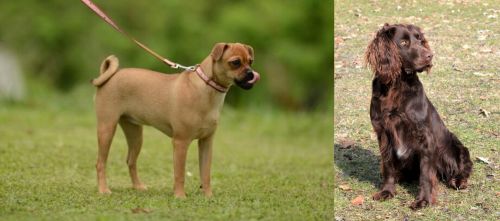 Muggin is originated from United States but German Spaniel is originated from Germany. Muggin may grow 40 cm / 15 inches shorter than German Spaniel. Both Muggin and German Spaniel are having almost same weight. Both Muggin and German Spaniel has same life span. Both Muggin and German Spaniel has almost same litter size. Muggin requires High maintenance. But German Spaniel requires Moderate maintenance
Muggin is originated from United States but German Spaniel is originated from Germany. Muggin may grow 40 cm / 15 inches shorter than German Spaniel. Both Muggin and German Spaniel are having almost same weight. Both Muggin and German Spaniel has same life span. Both Muggin and German Spaniel has almost same litter size. Muggin requires High maintenance. But German Spaniel requires Moderate maintenance
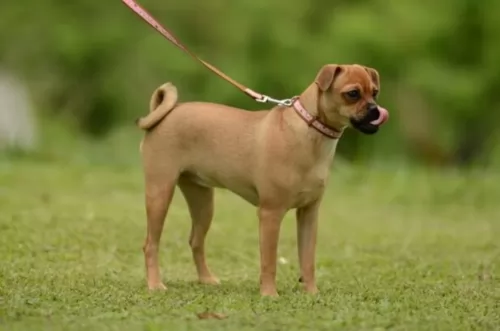 The Muggin is not a purebred dog but rather a cross breed. The hybrid dog population has exploding in the United States in the past ten to fifteen years. A lot of the success of crossbreeding can be attributed to the marketing of these dogs as “Designer Breeds”.
The Muggin is not a purebred dog but rather a cross breed. The hybrid dog population has exploding in the United States in the past ten to fifteen years. A lot of the success of crossbreeding can be attributed to the marketing of these dogs as “Designer Breeds”.
Designer breeds are developed because someone wants some of the characteristics of Breed X and some of the characteristics of Breed Y. Therefore, Designer breed XY is developed. In order to understand this hybrid dog, you need to understand the two purebred breeds they come from. The Muggin is the result of crossing the purebred Pug and the purebred Miniature Pinscher or Min Pin. So, we need to look at the origins of these two purebred breeds.
They are also referred to as Pin Pugs, Min Pin Pug, Pug Pin, Pugscher and were originally the Carlin Pinscher. However, these days there are other breeds besides the Pug and Min Pin making up the gene pool for the Carlin Pinscher. Because of this the Muggin has been separated from the Carlin Pinscher. The American Canine Hybrid Club has accepted the Muggin name for the Pug Min Pin cross.
Pugs are originally a Chinese breed and they were companions rather than working dogs of any kind. During the Han Dynasty they were the dogs of royalty. At the same time there were dogs very much like the pug in Japan and Tibet. The Pugs came to Europe by way of trades with the Dutch who then brought them to Europe. They were named the Mopshond and they caught the eye of the royalty in Europe as well.
Pugs were imported to the United States after the U.S. Civil War and in 1885 they were recognized by the American Kennel Club and called Pugs.
The Min Pin traces its origins to Germany a few hundred years ago. They were “ratters”, guarding the house and stables from all types of vermin. Most dog people believe that the Min Pin is much older than this, perhaps by thousands of years. Yet there is no detailed history to support that. Most believe the breed comes from the German Pinscher line. There might also be some Daschund and Greyhound in that line.
They were once called the Reh Pinscher. This was their name when they came to North America in 1919 and then the breed was renamed in 1972. The Miniature Pinscher Club of America was started in the early 1900’s while the AKC recognized the Min Pin in 1929. Today the Miniature Pinscher is a family dog, a companion.
The Muggin is a loving and loyal dog. All they want is for you to be happy and to share that happiness with them. They can also easily become a one person dog and bond intensely with that one person. They are not a hybrid that you can leave home alone while you go to work for 8 to 10 hours a day. No, the Muggin needs attention and lots of it. Despite this they are great with both kids and other dogs.
Because they are a cross breed, they are not recognized by the American Kennel Club. However, some hybrid registries do recognize the Muggin. These include the Designer Breed Registry, the International Designer Canine Registry, The Designer Dogs Kennel Club, the American Canine Hybrid Club, and the Dog Registry of America.
 Looking like a smaller version of the Red Setter, the German Spaniel, known also as the Deutscher Wachtelhund or German Quail Dog, hails from Germany.
Looking like a smaller version of the Red Setter, the German Spaniel, known also as the Deutscher Wachtelhund or German Quail Dog, hails from Germany.
It isn't a new dog breed and in fact it was developed around 1890 already. Used as a hunting dog, the German Spaniel isn’t well known outside of Germany, but it was recognized by the United Kennel Club in 1996.
There are a number of breeds which feature in the development of the German Spaniel, and one of the more prominent dog breeds used for the modern day German Spaniel is the extinct Stoeberer. The Stoeberer was crossed with water dogs and sporting spaniels to bring about the modern German Spaniel as we know it today.
It was in 1903 that the dog was recognized as a breed, and in the 1960s and 1970s the dogs were imported into the United States.
 As previously mentioned, the Muggin is a cross between the Pug and the Miniature Pinscher. They are small, shave sturdy legs, floppy ears, and a wrinkled forehead for the most part. Like all hybrids however, all first generation dogs do not look the same. Some might resemble the Min Pin more and others the Pug. Some might have the stockier body of the Pug and the short tail of the Min Pin. Or one could have the Pug’s curly tail and the athletic body of the Min Pin. The snout can be short or long, the ears heavy and floppy or small and thin.
As previously mentioned, the Muggin is a cross between the Pug and the Miniature Pinscher. They are small, shave sturdy legs, floppy ears, and a wrinkled forehead for the most part. Like all hybrids however, all first generation dogs do not look the same. Some might resemble the Min Pin more and others the Pug. Some might have the stockier body of the Pug and the short tail of the Min Pin. Or one could have the Pug’s curly tail and the athletic body of the Min Pin. The snout can be short or long, the ears heavy and floppy or small and thin.
Their coats will usually be fine and short, and colors can vary a lot. They might be black and tan like a Min Pin, or more like a Pug with a solid color of cream, brown, black, white or golden. They also tend to shed quite a bit no matter which parent they take after the most. They will either have brown noses and black eyes or brown eyes and black noses or any combination of black and brown.
If Muggins are only bred to Muggins the second and third generations will resemble each other more than the first generations will. However, at this point many breeders will try to strengthen the breed by occasionally adding in to the gene pool other dog breeds.
 As a medium-sized, muscular dog which stands at roughly 45cm to 54cm in height and weighs 18 – 25kg, the German Spaniel is a sporty gun dog who has a long back in relation to his height.
As a medium-sized, muscular dog which stands at roughly 45cm to 54cm in height and weighs 18 – 25kg, the German Spaniel is a sporty gun dog who has a long back in relation to his height.
The ears are long and floppy with wavy or curly hair that will need to be attended to so as to avoid matting.
He has a long, wavy or curly weather-resistant coat, being short on the head but with feathering around the legs and stomach. Color of the coat includes brown, reddish brown and white. The white markings can be found on the chest of the dog, the legs, tails and muzzle. `
The German Spaniel loves to work and be busy and if he can be included in his human family’s activities, then so much the better. He is a social dog and gets on well with other dogs as well as children in the home. The German Spaniel is an intelligent dog and easily trained. In fact training and socialization are important for him, making him obedient and a pleasure to have around.
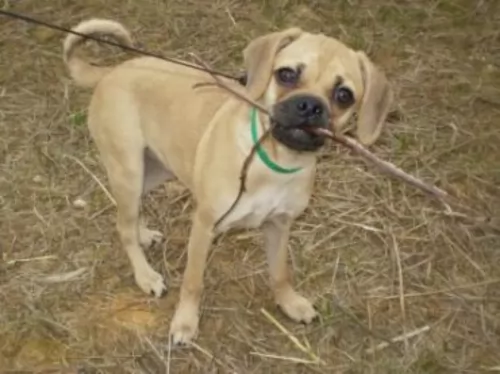 They are good with children but should be supervised.
They are good with children but should be supervised.
Energetic and loving little dogs.
Very adaptable if taken for walks or has space in a yard. Can live anywhere under those circumstances.
Very intelligent but strong willed dog. Needs strong leadership from their person.
 The German Spaniel makes a wonderful family pet. He is friendly and sociable, getting along well with just about all dogs and people. He loves his human family, wanting to be involved in all their activities.
The German Spaniel makes a wonderful family pet. He is friendly and sociable, getting along well with just about all dogs and people. He loves his human family, wanting to be involved in all their activities.
He is an active dog, used to hunting and being outdoors and he will therefore require a good deal of exercise from his owners, otherwise he becomes bored and frustrated and even destructive.
He is an adaptable dog, living in the city or the countryside, but wherever he is, exercise is important. Docile and non-aggressive, he has got all the characteristics that make him a splendid family pet.
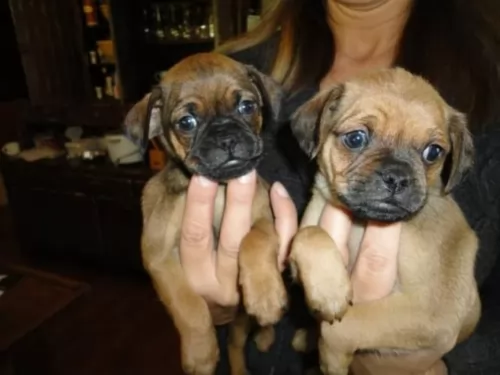 The first generation of Muggins may face all the health issues of either or both their parents, while second and third generations tend to have less health issues, They types of issues the first generation of Muggins might face include:
The first generation of Muggins may face all the health issues of either or both their parents, while second and third generations tend to have less health issues, They types of issues the first generation of Muggins might face include:
Nerve Degeneration – Degenerative Myelopathy or Dm – causes paralysis and eventually fatal.
 Health problems are fairly unknown with the robust German Spaniel, and if well cared for, he can reach 12 to 15 years of age.
Health problems are fairly unknown with the robust German Spaniel, and if well cared for, he can reach 12 to 15 years of age.
There are always one or two hereditary health concerns, and the health issues that affect the breed the most are hip dysplasia, skin allergies and splayed feet.
The American Kennel Club tells us that this type of foot is flat, with spreading toes. It is a fault in your pet because it doesn’t support his weight well, causing health problems later on for your pet. This is why it is so important to have your pet’s nails clipped from time to time, because long nails can turn a good paw into a splayed one, actually injuring the tendons.
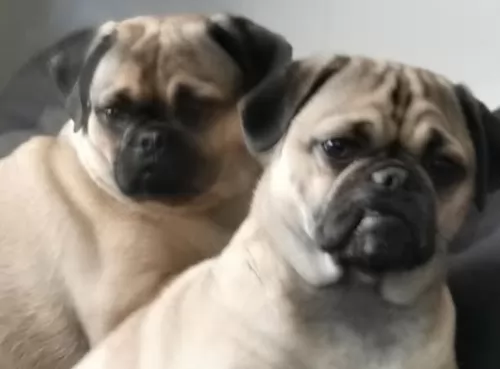 This crossbreed has a definite propensity to overeat and become obese from puppyhood. Feed the puppy a small dog dry food 3-4 times a day a total of ¾ of a cup to 1 cup.
This crossbreed has a definite propensity to overeat and become obese from puppyhood. Feed the puppy a small dog dry food 3-4 times a day a total of ¾ of a cup to 1 cup.
Again don’t over feed the adult Muggin or he will become obese easily. Feed at least twice a day one to one and half cups total.
High Energy
With the athleticism of the Min Pin taking precedence over the less active Pug, the Muggin is a fairly active dog. The Muggin is also not effective by the Pug’s difficulty with heat and cold. They love to go on long walks and need exercise to keep from being bored and destructive. However, remember there is a Pug in your Muggin and if she is not into exercise don’t try to get her to do more than she can.
You do want your Muggin to get enough exercise to fend off any tendency to be overweight. They are good at agility, jogging, obedience and watchdog activities.
 Shedding quite heavily and seasonally, the German Spaniel’s thick coat will require being brushed twice a week to keep it shiny and healthy. He loves the attention you give him at the same time.
Shedding quite heavily and seasonally, the German Spaniel’s thick coat will require being brushed twice a week to keep it shiny and healthy. He loves the attention you give him at the same time.
There are some German Spaniel owners who like to take their dogs in for professional grooming, requesting that the coat be cut short all round.
The long ears of your German Spaniel, especially if your pet spends a lot of time swimming, can be permanently damp, picking up dirt easily. Check inside the ears and make sure they are dry and clean to prevent ear infections.
Make sure to brush his teeth 2 or 3x a week as well because plaque build up leads to dental disease but it also negatively affects other body organs too, shortening your pet’s life.
Every dog, just like any human being, requires good nutrition, fresh water and warm, dry sleeping facilities to remain happy and to give him a good chance at longevity.
Apart from the very best commercially manufactured dog foods, ensure he occasionally gets some raw meat in as well as some cooked brown rice, vegetables and chicken. These can be added into his kibble.